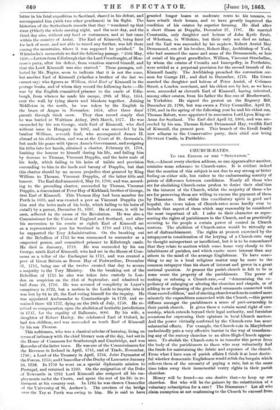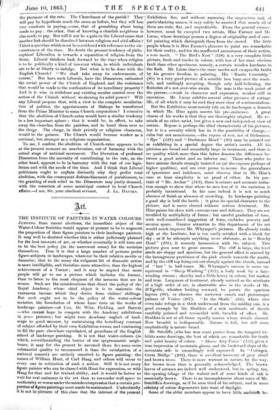CHURCH-RATES.
To THE EDITOR OF THE "SPECTATOR." Sin,—Almost every election address, as one appears after another, contains some reference to Church-rates. It is evident indeed that the mention of this subject is not due to any strong or bitter feeling on either side, but rather to the embarrassing scarcity of points of difference between candidates. Nearly all those who are for abolishing Church-rates profess to desire their abolition in the interest of the Church, whilst the majority of those who are for preserving them are willing to excuse the payment of them by Dissenters. But whilst this conciliatory spirit is good and hopeful, the views taken of Church-rates seem hardly ever to include that aspect of them which may reasonably be considered the most important of all. I refer to their character as repre- senting the rights of parishioners in the Church, and as practically securing to the people a certain power of control in Church matters. The abolition of Church-rates would be virtually an act of disfranchisement. The rights at present exercised by the ratepayerfrin consideration of the levying of a Church-rate may be thought unimportant or insufficient, but it is to be remembered that they relate to matters which come home very closely to the inhabitants of parishes, and which excite more interest than any others in the mind of the average Englishman. To have some- thing to may in a local religious matter may be more to the common ratepayer than his share of interest and power in a great national question. At present the parish church is felt to be in some sense the property of the parishioners. The power of making or refusing a Church-rate,—of "determining the ex- pediency of enlarging or altering the churches and chapels, or of adding to or disposing of the goods and ornaments connected with those sacred edifices," and of electing churchwardens to control more minutely the expenditure conn.ected with the Church,—this power diffuses amongst the parishioners a sense of part-ownership in their parish church. It gives them a certain moral right of cen- sorship, which extends beyond their legal authority, and furnishes occasions for expressing their opinions in local Church matters. And the power virtually .conferred by the Church-rate has some substantial effects. For example, the Church-rate in Marylebone undoubtedly puts a very effective barrier in the way of transform- ing any of the rectory churches to an ultra-High-Church appear- ance. To abolish the Church-rate is to transfer this power from the body of the parishioners to those who may voluntarily find the funds for maintaining the fabric and expenses of the church. From what I have seen of parish affairs I think it at least doubt- ful whether democratic Englishmen would relish the bargain which relieves them of the necessity of paying a rate, but at the same time takes away their immemorial vestry rights in their parish churches.
Money will be found—no one doubts that—to keep up our churches. But who will be the gainers by the substitution of a voluntary subscription for a rate? The Dissenters? Let all who claim exemption at not conforming to the Church be excused from the payment of the rate. The Churchmen of the parish? They will pay by hypothesis much the same as before, but they will lose two comforts in paying,—one, that of grumbling about being made to pay ; the other, that Of knowing a churlish neighbour is also made to pay. But will it not be a gain to the Liberal cause that another link should be dissolved between religious and civil affairs? This is a question which must be considered with reference to the cir- cumstances of the time. No doubt the present tendency of philo- sophical Liberalism is towards a separation of religion from the State. Liberal thinkers look forward to the time when religion is to be politically a kind of innocent whim, in which individuals are to be at liberty to indulge. But what is to be done with the English Church? "We shall take away its endowments, of course." But have such liberals, have the Dissenters, estimated the social power of the Church of England, and the resistance that would be made to the confiscation of its hereditary property ? And is it wise to withdraw any existing secular control over the action of the Church without weakening its solid power? Will any Liberal propose that, with a view to the complete seculariza- tion of politics, the appointments of Bishops be transferred from the Prime Minister to some Church corporation? I conceive that the abolition of Church-rates would have a similar tendency in a less important sphere ; that it would be, in effect, to take away the churches from the parishes, and to hand them over to the clergy. The clergy, in their priestly or religious character, would be the gainers. The Church would become weaker as a national, but stronger as a religious organization.
To me, I confess, the abolition of Church-rates appears to be at the present moment an anachronism, out of harmony with the actual stage of national movement. The liberation of professed Dissenters from the necessity of contributing to the rate, on the other hand, appears to be in harmony with the rest of our legis- lation and with the needs of the time. And I think that Liberal politicians ought to explain distinctly why they prefer total abolition, with the consequent disfranchisement of parishioners, to the granting of such relief as the Dissenters may justly demand, with the retention of some municipal control in local Church
affairs.—I am, Sir, your obedient servant, J. Lt,. DAVIES.































 Previous page
Previous page